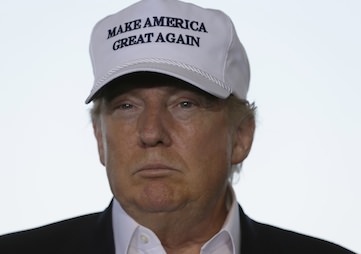A GOP Trapped by Donald Trump
The Republican Party is on the verge of being taken over by an egomaniac who appeals to the nation’s darkest impulses. Republican presidential hopeful Donald Trump. (LM Otero / AP)
Republican presidential hopeful Donald Trump. (LM Otero / AP)
The Republican Party is on the verge of being taken over by an egomaniac who appeals to the nation’s darkest impulses. Yet Donald Trump’s foes are splintered, tactically but also philosophically.
It doesn’t help that each of his three serious challengers is a flawed alternative. None is sufficiently dominant to force the others aside.
Sen. Ted Cruz has the most legitimate claim as a Trump-slayer. He’s now beaten him in four contests. Yet Cruz is so disliked by so many party leaders that they have refused to rally behind him. Indeed, many in the GOP view Cruz as being nearly as vulnerable to Hillary Clinton as Trump is. She took a large step toward securing the Democratic nomination with her seven victories over Bernie Sanders on Super Tuesday.
The Republican establishment plainly prefers Sen. Marco Rubio, but voters have not gone along. Rubio did manage to win the Minnesota caucuses. But he ran third in eight of the other 10 states that voted Tuesday and has lost 14 times since the nomination battle began.
Gov. John Kasich may well be the party’s strongest potential general-election candidate. But his relative moderation has so far marginalized him in an increasingly right-wing party. Only in Vermont, one of the few states where a less strident brand of conservatism still plays well in the GOP, did Kasich put up a fierce challenge to Trump. Still, Kasich lost.
But the difficulty Republicans have in identifying a single candidate to take Trump down speaks to a deeper problem. Its leaders have yet to decide whether Trump’s greatest sin is that he exploits bigotry or that he fails to bow to conservative ideological orthodoxy.
While some conservatives such as Sen. Ben Sasse, R-Neb., have brought the two strands together, there is ambivalence about how to go after Trump because the party itself has often played at backlash politics around race and immigration — and because, throughout President Obama’s tenure, it embraced Trump as an ally in stirring resentment on the far right. Mitt Romney, now one of Trump’s leading antagonists, warmly welcomed Trump’s endorsement in the 2012 presidential campaign.
Moreover, some of Trump’s most extreme positions have won wide approval from the Republican rank-and-file. For example, exit polls reported by CNN and The Washington Post found broad backing for his temporary ban on Muslims from entering the U.S: It was favored by 78 percent of Republican primary voters in Alabama, 67 percent in Texas and 63 percent in Virginia.
It’s true that anti-Trump Republicans found common ground in excoriating Trump for his equivocation in condemning the Ku Klux Klan and the racist leader David Duke. “This party does not prey on people’s prejudices,” insisted House Speaker Paul Ryan. In fact, the party has subtly and not so subtly played on racial resentment — birtherism, the claim that Obama is a Muslim, Ronald Reagan’s famous “welfare queen” reference — for decades. Trump is just cruder about it.
In any event, many Republicans dislike Trump primarily because they can’t abide his flight from conservative orthodoxy. He has criticized the Iraq War and George W. Bush’s foreign policy. He has attacked free trade. He opposes cuts in Social Security and Medicare. His vagueness on health care leaves open the possibility that he favors expansive government action to keep people, as he likes to put it, from “dying in the streets.”
If the main problem with Trump is that he is not conservative enough, Cruz is the obvious answer, and the Texan gave an effective speech Tuesday night listing all of Trump’s apostasies. But the rejection of Cruz by the powers that be underscores an additional ambivalence. The party wants somehow to keep the angry Trump voters inside the tent while also trying to broaden its constituency. This is the appeal of Rubio, who is more willing than Cruz to move in several directions at once. But this flexibility is also Rubio’s vulnerability.
It’s clear that a majority of Republicans prefer someone other than Trump. On Tuesday, he approached or broke 40 percent in only four states. That’s the establishment’s hope. It wants to deny Trump a delegate majority and to stop his nomination at the July convention.
But this strategy requires a philosophical and tactical unity of purpose that party leaders have, so far, been incapable of mustering. And blocking Trump now would enrage his army of followers and prove to them that the party is every bit as distant from their concerns as their hero has been saying.
E.J. Dionne’s email address is [email protected]. Twitter: @EJDionne.
© 2016, Washington Post Writers Group
Your support matters…Independent journalism is under threat and overshadowed by heavily funded mainstream media.
You can help level the playing field. Become a member.
Your tax-deductible contribution keeps us digging beneath the headlines to give you thought-provoking, investigative reporting and analysis that unearths what's really happening- without compromise.
Give today to support our courageous, independent journalists.






You need to be a supporter to comment.
There are currently no responses to this article.
Be the first to respond.